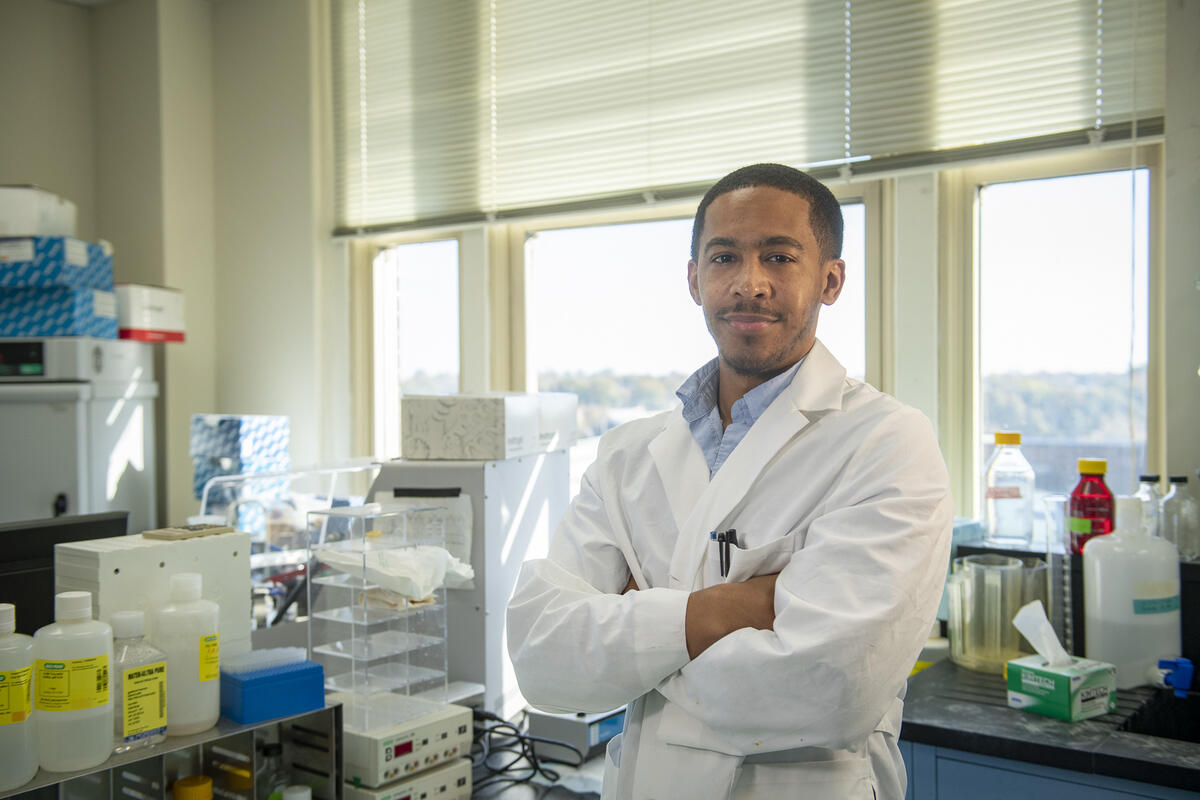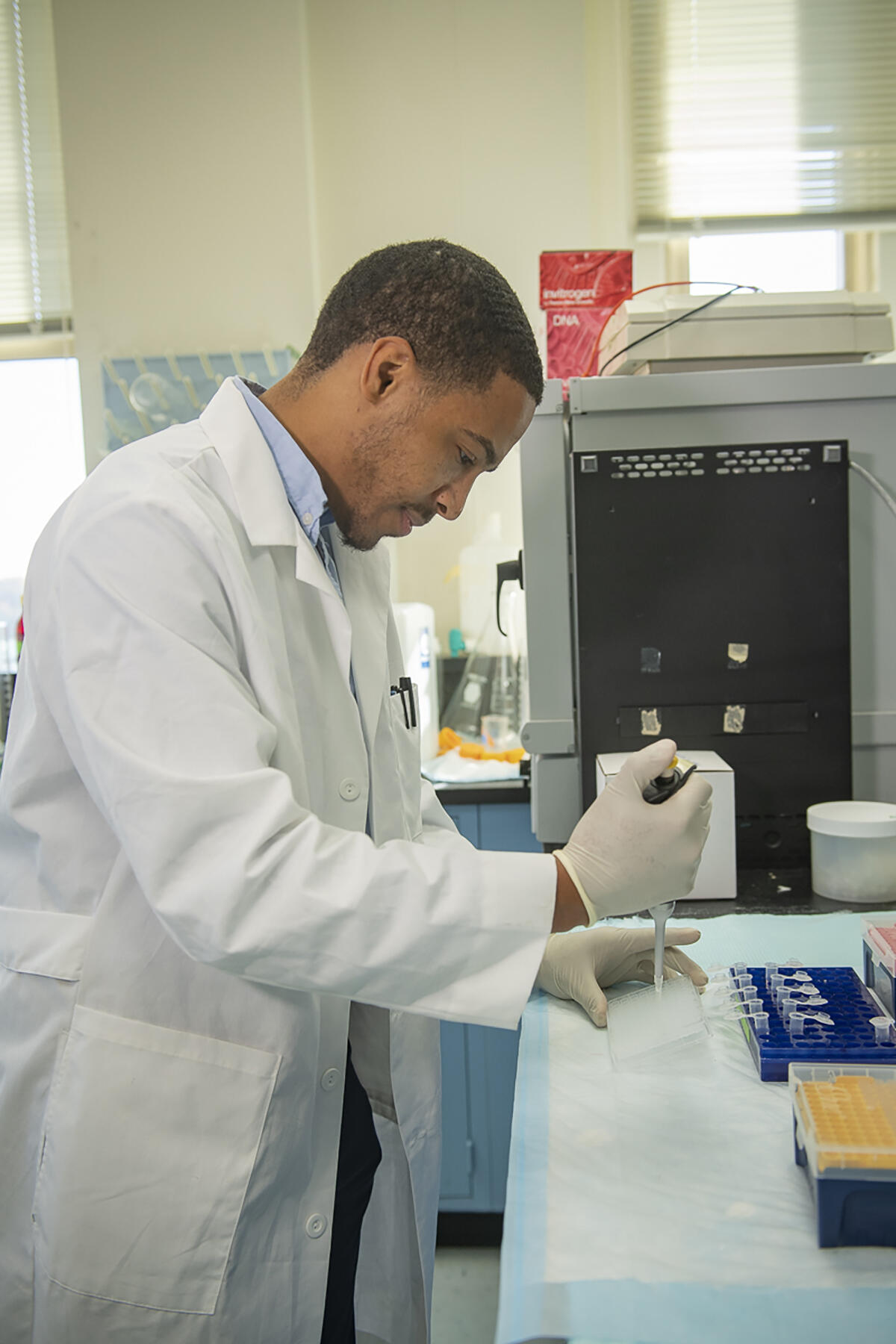
Feb. 29, 2024
How I found my research: Stanley Cheatham explores the gut’s reaction to chemotherapy
Share this story
How I found my research is an occasional series featuring VCU students sharing their journeys as researchers.
Stanley Cheatham is a Ph.D. candidate in the Virginia Commonwealth University School of Medicine’s Department of Pharmacology and Toxicology. He studies the side effects of chemotherapy drugs taken by cancer patients, as well as potential solutions for mitigating these adverse reactions.
Cheatham is in the third year of his doctoral program, but his connection to VCU goes back further. He earned his bachelor’s degree in biology with a minor in chemistry through the College of Humanities and Sciences. As an undergraduate student, Cheatham thought he would ultimately apply to medical school, but he developed a love for research after completing a capstone project for the university’s LEAD program. He then joined VCU’s Maximizing Access to Research Careers scholars program during his junior year. It was there that he connected with Hamid I. Akbarali, Ph.D., who is now his academic advisor.
Cheatham shared with VCU News how his research journey has evolved over time and the importance of staying stubborn.
Tell us the focus of your research ... and why it is important/impactful for all of us.
Chemotherapy is a form of cancer treatment that uses drugs to destroy cancer cells. While chemotherapy can be an effective tool for eliminating cancer, patients will often experience side effects while undergoing the treatment. A common side effect is gastrointestinal toxicities, such as diarrhea and inflammation in the mouth and gut. This can be very severe to the patient’s health and even life-threatening. These side effects can also be dose-limiting, which means that the patient cannot receive their chemotherapy treatment anymore. My research is focused on finding alternative strategies for treating these chemotherapy-induced side effects.
My lab specifically studies the enteric nervous system, which is the network of neurons that control our gastrointestinal tract and help it function. We look at the various ways that this part of our nervous system changes in response to chemotherapy. If we can understand how chemotherapy affects our gut at the neuronal level, we can then make modifications to help alleviate its side effects.
What inspired you to pursue this line of research?
Originally I was planning to apply for medical school, but I found a love for research during my undergraduate years at VCU. I became involved in the VCU LEAD program, which is focused on helping students become leaders through experiential learning and community engagement. Part of the program included a capstone project, and it was there that I became more interested in asking fundamental questions about what’s happening to patients and finding better treatment strategies.
Tell us about a surprise in your research journey.
I was at first surprised that I decided to stay at VCU to pursue my Ph.D. I was accepted into Ph.D. programs at other universities, but I ultimately chose VCU because my family is from here and I had a really great research mentor, Dr. Akbarali. When you are choosing Ph.D. programs, your mentor matters a lot. When you have a good mentor, I suggest you keep them close.
Also, at VCU I’ve had the freedom to get involved in things outside of academic research. I’m a McNair Scholars graduate advisor, I’m a part of a Yale fellowship for professional development, I sit on a board for a local nonprofit, and I’m on two subcommittees for the American Society for Pharmacology and Experimental Therapeutics. I’m not sure if other universities would have been as supportive as VCU in facilitating professional development in such a way.
Tell us about an obstacle or challenge you had to overcome in your work.
In research, you have your high highs and low lows. You have to balance them out to not feel defeated when you hit those low points in your research. There are days that you don’t want to come into the lab, you don’t want to have to repeat your experiment for the sixth time. So there are common struggles in academic research that you have to power through, which can be difficult at times, but my advice would be to stay stubborn and don’t give up.

Is there a memorable partnership or lesson you’ve embraced along the way?
Dr. Akbarali is always giving me words of wisdom as I’m completing my degree. He would say, “Just do one thing and do that one thing well.” It can be easy to get lost in the possibilities of science. There are so many different avenues you could explore, but you can’t do it all. To be more concise and precise with your research, you have to focus on just one aspect. The majority of Nobel Prize laureates, for example, have spent 20+ years working on one particular subject for the entirety of their career.
What do you find fulfilling about the research process?
When you are an undergraduate student conducting research, you are mainly focused on learning new things. But now, as a Ph.D. student, I’m collecting new data on things that weren’t known before. It’s really rewarding to be able to generate new knowledge yourself. Rather than learning information in the classroom, you’re making that information.
What advice would you offer undergrads to kick-start their own research journeys?
Reach out to professors whose research you think you might be interested in. Even if you don’t hear back at first, just keep trying and stay stubborn. You have to be your biggest advocate. If you really want to succeed in this field, don’t let anything deter you.
“How I found my research” is an occasional series featuring VCU student-researchers.
Subscribe to VCU News
Subscribe to VCU News at newsletter.vcu.edu and receive a selection of stories, videos, photos, news clips and event listings in your inbox.













